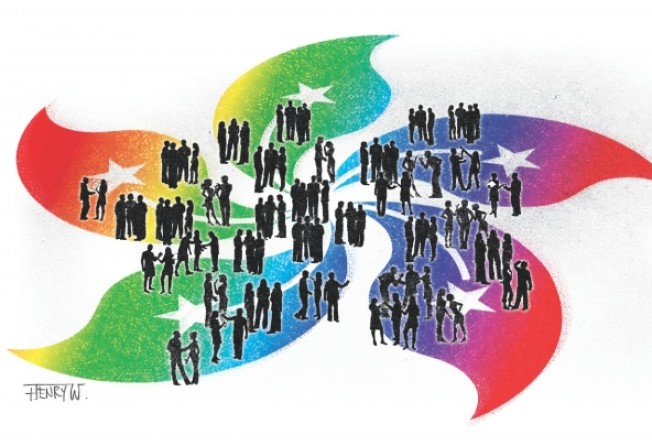Discussion about gender and sexual orientation should start with respect
York Chow says diverse views over issues of gender, sexual orientation and the law need to be fully discussed in public in order to help overcome stereotyping and discrimination

Since assuming my position in April, I have met over 130 different stakeholder groups from various fields to listen to divergent views. A number expressed concern about the possibility of legislation being brought in to protect people against discrimination due to their sexual orientation and gender identity.
Three things have become increasingly clear: first; lesbian, gay, bisexual and transgender (LGBT) individuals and their families do currently face enormous hardship. Second; the government must put in place policies and laws to protect these minority groups from discrimination. Third; the proposed legislation would neither destroy "family values" and freedom of speech nor would it lead to reverse discrimination.
There is plenty of evidence that sexual minorities in Hong Kong still face discrimination and harassment in employment or education. A study last year by the non-governmental organisation Community Business found that the majority (79 per cent) of the working population surveyed think LGBT individuals face discrimination or negative treatment. A 2009 survey by the Boys' and Girls' Clubs Association of Hong Kong suggested that 53 per cent of lesbian, gay and bisexual student respondents have faced discrimination, including bullying.
The present situation necessitates support for legally protecting this population. Irrespective of one's personal views, the right to non-discrimination in public is an irrefutable right of all humans.
Yet many LGBT individuals still struggle to access this right, fearing, not without reason, that they will lose their job or face harassment if they disclose their sexual orientation or begin to transition to their identified gender. Cultural discrimination against LGBT individuals has been propagated for centuries by different religious factions.
While we have seen some progressive guidance, it is time all religious leaders began approaching this issue with objectivity and universal compassion. Everyone, irrespective of their religious views, deserves the freedom to live and love without being stigmatised.
Some have argued that the proposed anti-discrimination legislation would destroy family values in Hong Kong. In my view, each family has their own private definitions of family values, which may differ from one to another. What matters is our collective stance and related government policies on public activities. When we talk about families and family values, we need to remember that LGBT individuals are also someone's family members. They are someone's sons, daughters, brothers, sisters, mothers or fathers. These families should also have the community's support, and we must not neglect their voices and their rights.
Another common concern is that the legislation would result in "reverse discrimination", whereby freedom of expression and religion would be unreasonably curbed or result in legal liabilities. Many of the concerns may stem from people's reluctance to change their discriminatory attitude and behaviour. We need to eliminate misunderstanding and misinformation about the impact of such a law.
For instance, it is necessary to distinguish between private and public activities. In overseas examples where such legislation exists, private activities such as one's own beliefs or parental guidance fall outside the coverage of the law.
One may still privately hold a belief as long as one does not act on it publicly in a way that would be discriminatory. Anti-discrimination legislation would level the playing field for all, irrespective of their sexual orientation or gender identity. It would neither entail "special treatment" for the LGBT population nor aim at changing personal values. In short, a balanced approach is possible.
Internationally, the rights to freedom of expression and religion can be reasonably limited to protect the rights of others from discrimination or other abuse.
Many jurisdictions have placed limits on freedom of expression in the interest of social cohesion and prevention of harm, such as banning speech which incites hatred or violence. Such provisions already exist in Hong Kong to protect everyone against vilification on the basis of race or disability.
Various groups have passionately expressed their views on the question of whether one's sexual orientation is inborn or acquired. Some hold the belief that if sexual orientation is acquired, it can be "fixed". But this misses the mark.
Many inborn conditions are treatable, and many acquired ones are not. Whatever one's belief on the origin of sexual orientation, homosexuality is not, and should not be viewed as, a treatable condition as is claimed by proponents of "affirmative/reparative therapy". The effectiveness and benefits of such treatments to change one's sexual orientation remain unsupported by scientific evidence, a position shared by many international professional bodies in the fields of psychiatry and psychology, including the Hong Kong College of Psychiatrists.
A number of lesbian, gay and bisexual individuals have told me that they face immense pressure from their own families to change their sexual orientation, including demands to undergo such therapies to "cure" them. This may hurt more than help. As Britain's Royal College of Psychiatrists noted in their submission to the Church of England's Listening Exercise on Human Sexuality in 2007: "There is now a large body of research evidence that indicates that being gay, lesbian or bisexual is compatible with normal mental health and social adjustment."
Moreover, as the college declared in its 2010 position statement: "So-called treatments of homosexuality create a setting in which prejudice and discrimination flourish." All service providers and mental health specialists should adhere to their professional standards and guidelines. Above all, do no harm.
We need more public dialogue and deeper understanding on this issue. A respectful discussion would dispel stereotypes and encourage empathy. Isn't it time to start?
Dr York Chow Yat-ngok is chairman of the Equal Opportunities Commission